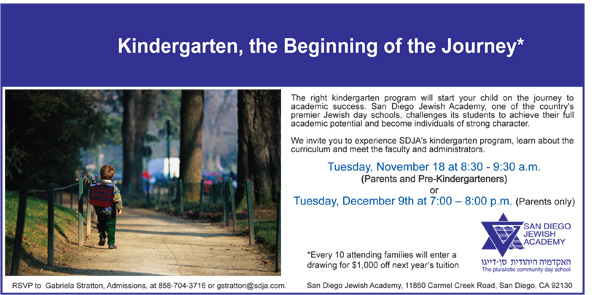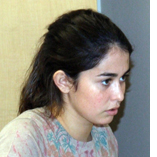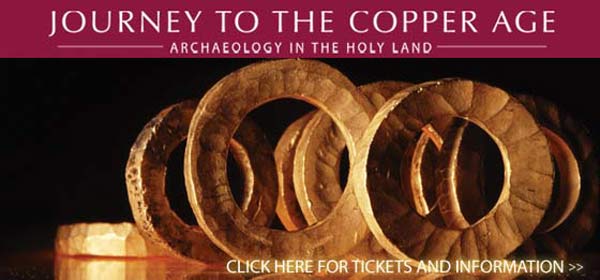| |
|
 WASHINGTON, D.C.—Visiting the Palestinian Authority for the first time, Mr. President, you might want to acquaint yourself with the thinking of the Palestinians on subjects of concern to you and the American people. We offer a few questions you might ask Abu Mazen: WASHINGTON, D.C.—Visiting the Palestinian Authority for the first time, Mr. President, you might want to acquaint yourself with the thinking of the Palestinians on subjects of concern to you and the American people. We offer a few questions you might ask Abu Mazen:
- My Secretary of State and I have referred to "the occupation that began in 1967." What year did the Israeli "occupation of Palestine" actually begin?
- When Americans refer to "Israeli settlements," they mean houses for Jews built east of the 1949 Armistice Line. Would you show me where "Israeli settlements" actually are on your map? (Looking at the map, ask, "Where is Israel?")
Shoshana Bryen
- When I ask Israelis where they conceive the State of Palestine to be after a peace agreement, they respond with some variation of the West Bank and Gaza, with some arrangement for Jerusalem. This corresponds with my understanding of where Palestine will be. Where do you conceive the State of Israel to be after a peace agreement? (Mr. President, "In the sea" is not an acceptable answer here.)
- You are receiving American money, equipment and the help of an American Army General to improve your security force capabilities. How can you give the American people confidence that our military is not simply producing more capable Palestinians terrorists? How can you give the Israeli people confidence that you will use these capabilities to protect the people of Israel from Palestinian terrorism, since some of that terrorism - including the murder of three Israelis in the past two months - was conducted by your own Fatah forces?
- Gilad Shalit was captured while you were in control of the Gaza Strip. Why has he been denied visits from the International Red Cross? Will you join me in a demand that the Red Cross visit him?
- And, speaking of the Gaza Strip, it was under your control there that Qassam rockets began to be fired at Israel. In 2007, 1,263 rockets and 1,511 mortar shells were fired at Israel, compared with 1,722 rockets and 55 mortars in 2006. I would not tolerate fire from Canada or Mexico into the United States, even into sparsely populated parts of North Dakota or Arizona. Will you join me in a demand to end to the firing of rockets and mortars at Israel?
- Palestinians call the establishment of Israel in 1948 the "naqba," the catastrophe. Is the catastrophe the fact that a Jewish state was established in part of Mandatory Palestine, or that the Arabs did not permit the establishment of the corollary Palestinian Arab State? If the former, how do you think the United States can help you correct the injustice, and why do you think we would?
- May I make an unannounced visit to a classroom in the Palestinian Authority and take home samples of textbooks and lesson plans?




SDJA STUDENT QUARTERLY
We worry if we will be accepted to a good college;
they worry if they'll be alive through high school
Editor's Note: The following commentary appeared in SDJA Student Quarterly, a publication of San Diego Jewish Academy. It is reprinted with permission
By Charly Jaffe
 SAN DIEGO—Surrounded by mountains of homework, never ending college applications, and a two week old postcard reminder for a dentist appointment that I missed anyway, I ignored my to-do list, checking my email instead. As a seventeen year old applying to college, it is my right to bemoan the unjust the amount of work I have to do and the overachievers getting in my way. Then, as I opened my first email from my friend Aviran, who attends Sha'ar Hanegev High School, my self righteous ranting came to a halt. SAN DIEGO—Surrounded by mountains of homework, never ending college applications, and a two week old postcard reminder for a dentist appointment that I missed anyway, I ignored my to-do list, checking my email instead. As a seventeen year old applying to college, it is my right to bemoan the unjust the amount of work I have to do and the overachievers getting in my way. Then, as I opened my first email from my friend Aviran, who attends Sha'ar Hanegev High School, my self righteous ranting came to a halt.
Charly Jaffe
"Hey honey! I know what you mean, I have so much homework too, it’s ok here, they send sometimes more missiles…now they are stronger and it’s scarier now, but I am glad everyone in Sderot here are all ok. Besides that I am great! Send my kisses to your family!"
I froze, realizing how self centered my attitude had become. These emails not only keep me in touch with close friends, but in touch with reality. The pressures of homework, sports, and friends seem to occupy everyone’s minds, and honestly, I can’t remember the last time I got through the day without a conversation about college, but I feel as though we have lost our perspective and let these pressures take over our lives.
Every year as we host 12 Israeli friends from our sister city, Sha'ar Hanegev, we find other teens exactly like us. They have drama with their friends, boyfriends and girlfriends, school, sports, the whole nine yards. We are all the same. Exactly alike, except for the minor fact that they attend high school every day a mile from Gaza with the risk of being hit by a Kassam rocket. While we worry about our college acceptances and bright futures, they worry about whether their class will be hit by a rocket and collapse again and contemplate what job they will have in the army. It took hours of conversations and tears before I could even begin to fathom what life in the ‘hot zone’ is like.
After asking some friends to describe what their lives are like, here are a few brief responses, unedited for spelling or grammar:
 “about your request... I cant right you down what you need. sorry... “about your request... I cant right you down what you need. sorry...
but I can tell you that I hate what my school become to! protected rooms from concrete every where, security guards and anxious mood all the time! and that’s not consider on the alert of the kassam... you heard it? not very pleasant... before one hour kassam hit in a very close house of my house.. Friday night and they don’t stopping.... anyway life turn to be not so simple. its feel weird to say that...”
Chen Behar 18, Kibbutz Ruchama
 “going to school knowing you might get hurt is scary, some people take it more seriously then the others but since the last two years the fear got bigger because its getting too close and as we told you one fell on the roof of our [school] building and at houses of our family and friends.... “going to school knowing you might get hurt is scary, some people take it more seriously then the others but since the last two years the fear got bigger because its getting too close and as we told you one fell on the roof of our [school] building and at houses of our family and friends....
"its been 7 years that they are shooting the kassams on us and we all feel that the government don’t do enough for making them stop. we think that because its a "home made" rockets people don’t take it seriously. there was so many miracles with the kassams that I’m sure god was involved or something...haha. a lot of time missiles fell on houses and the family wasn't in the house or they were sitting at the living room and the boom was in the kitchen and miracles like that. there was about 15 people that got killed in 7 years-thank god they missed a lot of times! but still, its ruining our normal life: people live in fear, a lot of kids cant sleep alone, kids started to peeing bed, mothers afraid to send their kids to school, the all families sleep together in the safe room because there is only one safe room -so there is no privacy...there is many houses that has no safe room in them...
I have so many things to say about that cause I live it and I tried to tell you a little bit about the way things are...”
Tal Bargig 18, Bet Shikma
After listening to what my friends’ lives have become, it is hard to continue viewing the world from such a self-centered point ofr view. At least for the first ten minutes. But something new and important always comes up, pushing my new revelation to the back of my mind. Of course there will always be important things happening, and we have to prioritize. I am not trying to deny the fact that our lives are stressful. I am trying to challenge you to make a change, however small it may be.
Keep our friends in Sha'ar Hanegev in your hearts and your prayers, get involved and learn more, or simply remind yourself every once and awhile of the gifts we do have. Our parents do everything to keep us safe: cautioning us against the dangers of the road; not to talk to strangers, and always to travel in groups at night. But for the mothers of these teens, there is nothing they can do to protect their children. Stop for a moment and imagine what it would be like to go to school every day not knowing if a rocket will hit. Not knowing where the next one will land. Not knowing twenty four hours a day, seven days a week. Not knowing would kill me. This is not a frightening nightmare they can wake up from; it is a way of life.
A mother should be able to protect her child. But for the students of Sha'ar Hanegev High School and their families, this seemingly basic right is infeasible. These are real people, our friends, forced to live in fear. So what I ask of you, at the very least, is to be aware. Be aware of their constant struggle; be aware of the gifts we have. We all face hardships in our lives, but the one thing we all have is the ability to roam the halls of our schools and streets of our city in relative safety and the peace of mind that comes with it. Living in fear is not a punishment, but living without it is certainly a gift.


THE JEWISH CITIZEN
Primer on Judaism suffers from errors
By Donald H. Harrison
 SAN DIEGO --On the back cover of At Home With Judaism, author Peter Galgut advertises what turns out to be the primer's deficiency: "Dr. Galgut is not a rabbi! He is also not a great yeshiva scholar! He is a Jew! ..." While reading this book, which sells for $30 over the Internet, I felt my eyebrows arching over a number of the statements that were at variance with what I have learned over the years. I'm fortunate that when I have a question about Judaism there are a number of rabbis I can turn to, including some who write columns for this website. So I sent the controversial information to San SAN DIEGO --On the back cover of At Home With Judaism, author Peter Galgut advertises what turns out to be the primer's deficiency: "Dr. Galgut is not a rabbi! He is also not a great yeshiva scholar! He is a Jew! ..." While reading this book, which sells for $30 over the Internet, I felt my eyebrows arching over a number of the statements that were at variance with what I have learned over the years. I'm fortunate that when I have a question about Judaism there are a number of rabbis I can turn to, including some who write columns for this website. So I sent the controversial information to San
Donald H. Harrison
Diego County Rabbis Wayne Dosick of the Elijah Minyan and Leonard Rosenthal of Tifereth Israel Synagogue to comment whether Galgut was right or wrong. The reason I can not recommend Galgut's book, at least in its present edition, is that his information so often was wrong.
Some examples: He wrote on page 8 that "in addition to the Ten Commandments, there are an additional 613 proscribed commandments or acts that need to be performed to maintain a'good' Jewish life." Obviously Galgut meant to say "prescribed" rather than "proscribed" (words of opposite meaning), but I was more worried about whether the Ten Commandments were in addition to the 613 commandments or, as I had been taught, were among the 613.
Both Rabbi Rosenthal and Rabbi Dosick confirmed that the Ten Commandments are included in the 613. "I would question his statement about needing to observe all 613 to observe a good Jewish life. Certainly those connected to the Temple (in Jerusalem, destroyed by the Romans) cannot be observed!" Rosenthal commented.
On page 14, in discussing the laws of kashrut, Galgut wrote: "It is also forbidden to eat the flesh of any animal that has not died of natural causes, or that has been 'torn by beasts.'" I had thought that animals that died of natural causes were forbidden to eat. Again Dosick and Rosenthal agreed that Galgut got it wrong. "Only animals properly slaughtered are allowed," commented Dosick.
On page 21, Galgut wrote: "Chollah actually means white bread. In times gone by white bread was a luxury, as most people ate coarse brown bread during the week. On the occasion of Shabbat, a special bread made from highly refined white flour was a significant way of celebrating the special nature of the day." Commented Rosenthal: "Challah is from the Bible. It was the part of the bread broken off and offered to God... We still do this symbolically today. It is also generally known as 'egg bread'— richer than daily bread." In accord with this, Dosick wrote: "Challah is a tithe for a priest (See Numbers 15:17). When bread was baked, a small portion was taken off ... as a tithe (a way to feed) the priests. To this day, traditional bakers (commercial and home) take off a piece of the dough and bake it separately in remembrance of the tithe."
Discussing Pasover, Galgut wrote on page 23: "It is also customary to have a Hillel sandwich. No one knows the origin of this custom, but some think that the sweet spicy apple mixture used as a filler is to emphasize the weakness of our liberation, or alternatively the soft sweetness of this filling enclosed in the hard dry Mazos reminds us that even amongst the trials and tribulations of life in Egypt and the subsequent wanderings in the desert with all its hardship, the sweetness of our liberation, and God's presence was enclosed in the harshness of the outside world."
That is a pretty explanation, but the big problem is that a Hillel sandwich isn't made with "the sweet spicy apple mixture" that we know as charoset. Instead it is made with maror or bitter herb. Rabbi Rosenthal commented that the explanation for the Hillel sandwich not only is in the Mishne, it also is in the Haggadah that is read at every seder. Rabbi Dosick said that assuming Galgut meant to describe charoset and not a Hillel sandwich, the more traditional explanation for charoset is that "it is a symbol of the mortar made by the slaves for the building. ... The Hillel sandwich comes around the time of the 2nd Temple."
In an essay on the synagogue and its symbols, Galgut wrote on page 28: "On top of the Torah are rimonim (bells). The rimonim are usually representations of pomegranates which symbolize fertility and life. In ancient times the priestly robes had little bells along the edges so that people would always be aware of the High Priest."
Rosenthal and Dosick both confirmed that "rimonim" means "pomegranates" not bells. Dosick further commented: "It seems (parshat Pekudei) that the bottom of the High Priest's cloak had puffs of wool (later commentators will say 72) that looked like pompoms—pomegranates. Some say that bells were embedded into the wool puffs (some say all 72, some say half). The bells are called Pa'amonim.... The awareness was not for the people, but for the priest himself. Like the tzitzit, the fringes on the corners of garments, the bells were to remind the priest of all the commandments of God."
Possibly there are still more errors in Galgut's book. Those were just the ones that I, a fellow layman, spotted. I cannot fault Galgut for writing this book; my criticism would be that he didn't subject it to a more rigorous verification process before it went out to print. I hope that Galgut will profit from the commentaries of Rabbis Dosick and Rosenthal, then perhaps consult his own panel of rabbis and bring out a corrected second edition.
Ten years ago, Rabbi Dosick wrote Living Judaism: The Complete Guide to Jewish Belief, Tradition and Practice, a far more comprehensive book on Judaism, much more meticulously researched. The 404-page sells on Amazon for less than half the price Galgut asks for his 69-page primer. Dosick's book is one that I can recommend with absolute confidence. To both Rabbi Dosick and to Rabbi Rosenthal, I tender my thanks.
SAN DIEGO JEWISH WORLD THE WEEK IN REVIEW
Eitan Frysh in San Diego: Frum Jewish director stays out of theatres on Shabbat, chooses only tasteful plays
Peter Garas in Canberra: 25,000 salmon free for the taking has his mouth just watering for fresh bagels
Donald H. Harrison in San Diego: Movie probes after-effects of the Holocaust: Dear Mr. Waldman will screen twice at San Diego Jewish Film Festival
Gabi Maio in San Diego: Teen recounts she was chosen for summer leadership trip to Israel
Dov Burt Levy in Salem, Massachusetts: Readers share opinions on whether we should teach children about the Shoah
Ira Sharkansky in Jerusalem: What about Israeli-on-Israeli violence?
Dorothea Shefer-Vanson in Mevasseret Zion, Israel: A glorious chorus brought in New Year
Tuesday, January 1, 2008 (v2, no. 1)
Peter Garas in Canberra, Australia: Forget the tail of the dog that bit you; now it's the breeze from the air that you heated
Donald H. Harrison in Escondido, California: Dinner and a movie: two fine inter-cultural opportunities
J. Zel Lurie in Delray Beach, Florida: Har Homa once again the monkey wrench in the Middle East peace process
Lynne Thrope in San Diego: Fine restaurants to offer special prix fixe menus during San Diego's 'restaurant week'
MONDAY, DECEMBER 31
Shoshana Bryen in Washington, D.C.: Turkey and U.S. join to fight Kurdish terror
Donald H. Harrison in Los Angeles: Animals stand in for people at Skirball's imaginative, interactive Noah's Ark exhibit
Sheila Orysiek in San Diego: I am resolving to be more resolute
< BACK TO TOP
|
|

